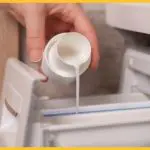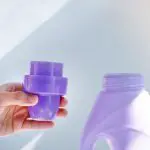Can fabric softener be used as laundry detergent? Unfortunately, the answer to this common question is no. Fabric softeners do not contain cleaning agents or enzymes to dissolve dirt and stains. The process of washing fabric with fabric softener will leave you with clean clothes that still smell great, but they won’t be completely clean unless you add laundry detergent to the wash load.
If you just want your clothes to smell good and you don’t care about removing stains or getting them clean, then yes, you can use fabric softener. But if you’re looking for something that will actually get rid of stains and make your clothes look good again, then it’s best to stick with laundry detergent.
Table of Contents
What Happens if You Use Fabric Softener as Detergent?
Fabric softeners are designed to make your clothes feel softer and smell better. You can use them to soften dry clothes that you’ve already washed, and they’re great for laundry that’s been sitting around a while. Even if you’ve just washed your clothes and dried them, a fabric softener can help add some extra softness.
But if you’re using fabric softeners on your laundry instead of detergent, what happens?
Using fabric softener as detergent will leave your clothes feeling soft but not clean. Fabric softeners contain chemicals that coat the fibers in your clothing, so they won’t get fully rinsed out when you wash them. This can make it harder for dirt and grime to wash away during the rinse cycle.
If these chemicals aren’t removed from clothing before washing it again (which is likely, since many people use fabric softener after every wash), they’ll build up over time and create a residue on your clothes that attracts dirt and stains.
Washing with too much fabric softener also makes it harder for soap or detergent to do its job properly—because soap doesn’t dissolve well in water with a high concentration of fabric softener already present, it ends up being less effective at cleaning your clothes.
Bottom line: use fabric softener sparingly, if at all, and make sure to rinse your clothing thoroughly after using it to remove any residual chemicals. Your clothes will stay cleaner and fresher-smelling in the long run!
What Can You Do if You Accidentally Used Fabric Softener as A Detergent?
Fabric softener is designed to make your clothes feel softer and smell better. It does this by coating the fabric in a thin layer of chemicals, including silicone and glycerin. This coating makes it harder for the detergent to work its magic on the fibers of your clothes, so they don’t get as clean as they should.
If you accidentally use fabric softener instead of laundry detergent, there’s no harm done. You’ll just have to run another load of laundry with the right products — but only if you’re sure you didn’t already run them through a cycle together.
If you accidentally use fabric softener instead of laundry detergent, there’s no harm done. You’ll just have to run another load of laundry with the right products — but only if you’re sure you didn’t already run them through a cycle together.
Accidentally using fabric softener instead of laundry detergent won’t damage your clothes or your washing machine, but it also won’t get your fabrics very clean.
Difference Between Fabric Softener VS Detergent
Fabric softener is a chemical that is used to make your clothes look and feel softer. It does this by coating the fibers of the fabric, which prevents them from rubbing against each other. This reduces friction and prevents pilling (the formation of small balls on the fabric).
Detergents are commonly used in washing machines to clean and disinfect clothing. They remove stains, dirt, and other impurities that can accumulate on your clothes over time. Detergents are also used in dishwashers and bathtubs to clean surfaces.
Fabric softener vs detergent: What are they made of?
Fabric softeners contain chemicals known as surfactants or tensioactive agents. These chemicals reduce surface tension between different substances by lowering their interfacial tension. This makes it easier for the water molecule to mix with oil molecules on fabrics, which helps remove stains from clothing more easily.
Detergents have a similar function but they don’t contain any surfactants or tensioactive agents like fabric softeners do. Instead, they’re usually made from compounds called anionic surfactants which help remove oils from fabrics that can cause stains when left alone for too long.
What Can Be Used as A Substitute for Laundry Detergent?
For most people, the thought of going without laundry detergent seems pretty far-fetched. Most people probably don’t even consider it. But in some situations and locations, options are very limited.
If you’re on a tight budget, or if you find yourself stuck away from civilization for an extended period of time, then looking for a substitute for laundry detergent makes sense.
Let’s take a look at what can be used as a substitute for laundry detergent!
White vinegar
Vinegar is a natural disinfectant and can be used as a laundry detergent substitute. Add 1/2 cup of white vinegar to the rinse cycle of your wash load. You can also add it directly to stains, but be careful not to soak them too long before washing as this can cause discoloration.
Baking soda
Baking soda is another great alternative to store-bought laundry detergent. Add 1/2 cup baking soda to the wash cycle of your load or add directly to stains before washing. It works well on both fresh and dried on stains, but should not be used on colored clothing due to discoloration concerns.
Lemon juice
Lemon juice is another natural stain remover that can easily be used as an alternative to laundry detergent if you’re in a pinch or don’t have any in your house at all! Simply squeeze some lemon juice onto the stain, let it sit for 20 minutes and then wash as usual with cold water.
Dish soap
Dish soap is another common household item that can be used as a replacement for laundry detergent if necessary! Just add 1 tablespoon of dish soap into each sink full of water when doing hand-wash only items (like delicates)
Borax
Borax is a natural mineral compound that’s often used as an ingredient in laundry detergents, but it can also be used on its own. Borax is sodium borate, which comes from minerals found in the earth’s crust. It has disinfectant properties because it kills bacteria and fungi that causes odors and stains. In fact, borax has been used for centuries as an antibacterial agent for cleaning clothes, including diapers!
Vodka
Vodka is another natural substance that can replace laundry detergent when mixed with water and rubbed into clothing stains such as wine or blood (which were two of our most common questions). Vodka may be just as effective as commercial laundry detergents at removing stains, but it won’t get your whites whiter so it shouldn’t be used on its own.
Can I Use Shampoo to Wash My Clothes?
If you are desperate and have no other options, you can use shampoo to wash your clothes. However, this is not a good idea for several reasons.
First, shampoo isn’t made for washing clothes, so it won’t be as effective as laundry detergent.
Second, shampoo is designed to be rinsed out of your hair. If you don’t rinse the suds out of your clothing, you may end up with a residue that will make them look dingy and feel scratchy.
Finally, shampoo can build up in the fibers of your clothes over time if not properly rinsed away. This can cause them to lose their shape and wear out more quickly. In short, while you can technically use shampoo to wash your clothes in a pinch, it’s not the best idea.
Conclusion
If you’re looking for a way to make your clothes smell nice without having to do laundry quite as often, fabric softener is a great option.
However, if you want to get rid of stains and dirt from your clothes, you’ll need to use laundry detergent.
If you want to use fabric softener instead of laundry detergent, don’t expect your clothes to be completely clean. The process of washing with fabric softener will leave them smelling great—but they’ll still need a wash with laundry detergent in order to be thoroughly clean.
- How Does Ring Spun Cotton Affect Garment Fit and Shape Retention? - August 13, 2024
- What Are the Challenges in Producing Ring Spun Cotton? - August 13, 2024
- Is Ring Spun Cotton Suitable for Plus-Size Clothing? - August 13, 2024






